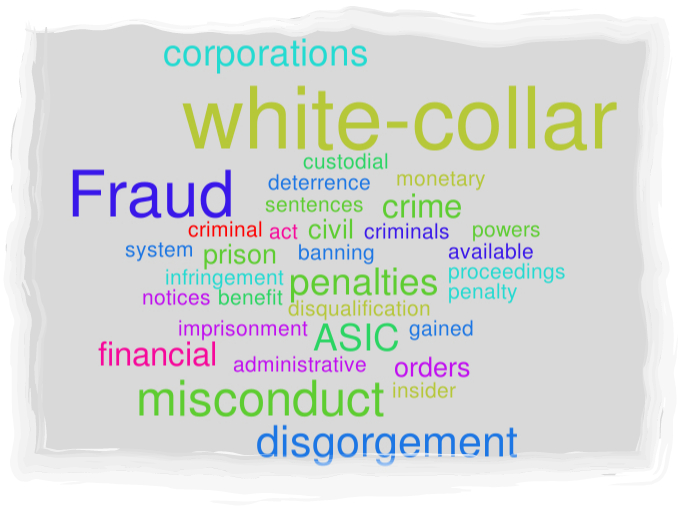In a move that seems to be based on the curious notion that corporate, white-collar crime is not real crime, the federal government has proposed to reduce the right of the Australian Securities and Investments Commission (ASIC) to access telecommunications metadata.
“The bill contains a package of reforms to prevent the further degradation of the investigative capabilities of Australia’s law enforcement and national security agencies.”
“This bill does not provide agencies with new powers to access communications data; the bill simply ensures that data will continue to be available to agencies as a part of legitimate investigations, subject to the same, strict limits that currently apply. In fact, the bill will strictly limit, and indeed reduce, the range of enforcement agencies permitted to access telecommunications metadata without a warrant. The bill will allow what we might call ‘traditional’ law enforcement agencies, such as the police, Customs, crime commissions and anticorruption bodies, to access this information. The bill will also grant the Attorney-General the power to declare, via legislative instrument subject to parliamentary oversight, additional agencies….” (Underlining mine.)
The Australian Securities and Investments Commission (ASIC) is one of the agencies whose right to metadata has been reduced.
The following is an extract from the submission in January 2015 by the ASIC to the Senate Inquiry.
ASIC as a major criminal law enforcement agency
ASIC is, among other things, a major criminal law enforcement agency. The types of white collar crime investigated and prosecuted by ASIC are both notoriously difficult to prove and capable of causing immense harm to Australia’s financial system. This harm includes damage to the integrity of Australia’s financial markets, and devastation to individual victims who risk losing their houses and life savings.
This significant risk is expected to increase into the future given the ever-growing pool of superannuation investments and large number of Australians expecting to retire from active work in the next 20 years.
ASIC’s express criminal law enforcement functions and obligations extend to the investigation and prosecution of “prescribed offences” and “serious offences”, as defined in sections 5(1) and 5D of the TIA Act. For example:
- ASIC is responsible for the investigation and prosecution of criminal offences in a range of Commonwealth statutes, [1] including the following “serious offences” in Part 7.10 of Corporations Act 2001 (Cth) (Corporations Act) that are punishable by imprisonment for up to 10 years:
(i) insider trading (s 1043A);
(ii) market manipulation (ss 1041A to 1041D); and
(iii) financial services fraud (ss 1041E to 1041G), such as fraudulent investment schemes (including Ponzi schemes), cold calling ‘boiler room’ investment frauds and superannuation fraud; and
- ASIC is also empowered to, and regularly does, investigate and prosecute other criminal offences (Commonwealth, State or Territory) where the conduct involves corporations, managed investment schemes or certain types of financial fraud, [2] including the following “serious offences”:
(i) general fraud offences under State legislation punishable by a maximum term of imprisonment of 7 years or more. [3]
ASIC is the only agency with specific statutory responsibility for investigating and prosecuting criminal offences in the Corporations Act. ASIC is also the only agency with a standing statutory entitlement to commence prosecutions for offences in the Corporations Act. [4]
ASIC regularly exercises these criminal law enforcement functions and obligations. For example, between 1 July 2009 to 30 June 2014:
- ASIC, in collaboration with the Commonwealth Director of Public Prosecutions (CDPP), secured criminal convictions against 129 persons for indictable offences, including “prescribed offences” and “serious offences” as defined in ss 5(1) and 5D of the TIA Act, and achieved sentences of imprisonment against 68 persons; [5] and
- ASIC, through the conduct of its own prosecutions, secured criminal convictions against 2,404 other persons for less serious summary offences, an average of 481 persons convicted a year.
On 24 June 2013 the Parliamentary Joint Committee on Intelligence and Security (PJCIS) handed down its report entitled Report of the Inquiry into Potential Reforms of Australia’s National Security Legislation. In its report the PJCIS did not recommend removing or reducing ASIC’s existing powers under the TIA Act to access telecommunications data or stored communications. Rather, the PJC wrote the following (at pp.25-26):
2.54 The Committee is satisfied that access to telecommunications data for serious crime and threats to security is justified. Access for agencies not enforcing the criminal law or investigating security threats should be subject to further review.
Recommendation 5
The Committee recommends that the Attorney-General’s Department review the threshold for access to telecommunications data. This review should focus on reducing the number of agencies able to access telecommunications data by using gravity of conduct which may be investigated utilising telecommunications data as the threshold on which access is allowed.
This conclusion and recommendation does not justify the proposed removal of ASIC’s existing powers to access telecommunications data given that ASIC is responsible for enforcing the criminal law, including investigating and prosecuting “serious offences” as defined in the TIA Act.
Neither the Explanatory Memorandum nor the second reading speech relating to the TIA Bill elaborates on the criteria that were adopted in determining which agencies should be included within the definition of “criminal law-enforcement agency”, but in the second reading speech the Minister for Communications stated:
[T]he bill will strictly limit, and indeed reduce, the range of enforcement agencies permitted to access telecommunications metadata without a warrant.
The bill will allow what we might call ‘traditional’ law enforcement agencies, such as the police, Customs, crime commissions and anticorruption bodies, to access this information.
In light of ASIC’s explicit, extensive and longstanding [6] criminal law enforcement functions, there does not appear to be logical reason for its exclusion from the primary definition in the Bill of a “criminal law -enforcement agency”. In particular, ASIC is not aware of any specific submission or suggestion to the effect that it has either misused its existing powers under the TIA or should have them removed.

ASIC’s existing powers under the TIA Act
ASIC is currently an “enforcement agency”, as defined in s 5(1) of the TIA Act. [7] Consequently:
- authorised ASIC officers are able to receive telecommunications data if it is reasonably necessary for enforcement of the criminal law or a law imposing a pecuniary penalty; and
- ASIC has the ability to seek a warrant from an independent judicial officer authorising ASIC to access stored communications for the purpose of investigating a “serious contravention”, as defined in s 5E of the TIA Act.
Any subsequent use of telecommunications data or stored communications obtained by ASIC is strictly restricted by a number of legislative and procedural safeguards, in addition to oversight regimes. These are outlined later in the submission.
An important consideration in any assessment of the necessity of ASIC having the ability to access telecommunications data and stored communications is the fact that many of the offences it investigates and prosecutes, including all of the offences in Part 7.10 of the Corporations Act, are actually constituted by communications or otherwise generally require proof of communications for a successful conviction. For example:
- the insider trading offence in s 1043A(1) ordinarily requires proof that inside information was communicated to the accused;
- the insider trading offence in s 1043A(2) specifically criminalises the “communication” of inside information;
- the market manipulation offences in ss 1041A to 1041C ordinarily require proof of communications, such as placing orders for the offending trades by telephone or over the internet, and the identity of the persons who made them;
- the market manipulation offence in s 1041D specifically criminalises the “circulation or dissemination” of offending “statements or information”;
- the offence in s 1041E (false or misleading statements) specifically criminalises the “making” or “dissemination” of offending statements or information;
- the offence in s 1041F (inducing persons to deal) criminalises the “making” or “publishing” of offending statements or information; and
- the offence in s 1041G criminalises engaging in “dishonest conduct” in the course of carrying on a financial service business, which commonly involves communications of false or misleading information.
The central importance of telecommunications evidence and the need for ASIC to obtain such evidence in relation to investigations of these market-related offences was specifically recognised by the then Minister for Financial Services, Superannuation and Corporate Law when introducing reforms to the TIA Act in 2010. [8]
One particular type of serious criminal activity investigated by ASIC that involves communications is “cold calling” investment frauds, which can be prosecuted as a serious fraud offence against State Acts or as a financial services fraud offence against the Corporations Act. These frauds involve individuals being unexpectedly called and subjected to intense pressure into buying investments on the premise of high returns (sometimes as high as 300 per cent in just 15 days), but the returns are often completely fictitious and the investments a sham or worthless.
An example of cold calling frauds involved ASIC’s investigation between September 2009 and April 2013 of 17 cases of investment fraud causing over $8 million in losses to Australian investors. In these investigations, ASIC used telecommunications data as a crucial form of intelligence. The Australian Crime Commission estimated that between January 2007 and April 2012 more than 2,600 Australians lost over $113 million to investment frauds, but it is believed there is a high level of underreporting and the extent is far greater. [9]
Investigations and prosecutions for Corporations Act offences are notoriously difficult, resource-intensive and time-consuming. Effective performance of ASIC’s law enforcement functions can only be achieved if we have adequate powers to obtain information and evidence about suspected contraventions of the laws we administer. Given the increasing role of telecommunications in the delivery of financial services in Australia, including carrying out trades on Australia’s markets, ASIC anticipates that its need to obtain telecommunications data and stored communications will correspondingly increase over time.

Footnotes:
[1] See, eg, ss 1(2)(g), 13 & 49(2) of the Australian Securities and Investments Commission Act 2001 (Cth) (ASIC Act); s 1315 of the Corporations Act; and ss 247 and 274 of the National Consumer Credit Protection Act 2009 (Cth) (NCCP Act). While all criminal prosecutions arising out of ASIC investigations are commenced by ASIC and are based on briefs of evidence prepared by ASIC, prosecutions for indictable offences are generally continued by the Commonwealth Director of Public Prosecutions (CDPP).
[2] See, eg, s 13(1)(b) of the ASIC Act. Prosecutions for State or Territory offences are commenced by ASIC or its officers in accordance with the law in each jurisdiction governing the commencement of prosecutions.
[3] ASIC is also responsible for the investigation and civil prosecution of contraventions of a range of federal laws imposing substantial pecuniary penalties. Examples of civil penalty cases successfully brought by ASIC include: ASIC v GE Capital Finance Australia [2014] FCA 701 (penalties totalling $1.5 million); ASIC v Newcrest Mining Ltd [2014] FCA 698 (penalties totalling $1.2 million); Idylic Solutions Pty Ltd, Re; ASIC v Hobbs (2013) 93 ACSR 421 (penalties totalling $670,000); ASIC v Macdonald (No 12) (2009) 259 ALR 116 (James Hardie case) (penalties totalling $670,000); ASIC v Vines (2006) 58 ACSR 298 (penalties totalling $640,000); ASIC v Vizard (2005) 54 ACSR 394 (penalties totalling $390,000); ASIC v Loiterton (2004) 50 ACSR 693 (penalties totalling $805,000); ASIC v Adler [2002] NSWSC 483 (HIH case) (penalties totalling $900,000).
[4] Pursuant to s 1315 of the Corporations Act and s 49(2) of the ASIC Act.
[5] Some examples of recent criminal cases successfully pursued by ASIC include: R v Johnson [2014] VSC 175 (imprisonment for 6 years and 6 months, with a non-parole period of 3 years and 6 months); R v Veitch, NSW District Ct, 26 June 2014 (imprisonment for 6 years and 2 months, with a non-parole period of 4 years); R v Maile, QLD District Ct, 20 June 2014 (imprisonment for 4 years and 3 months, with a non-parole period of 16 months); R v Williams, QLD District Ct, 20 June 2014 (HIH investigation) (imprisonment for 4 years and 3 months, with a non-parole period of 16 months); R v Kur, WA District Ct, 21 February 2013 (imprisonment for 4 years, with a non-parole period of 2 years); R v Evans, NSW District Ct, 7 May 2013 (imprisonment for 5 years, with a non-parole period of 3 years and 9 months); R v Weerappah, VIC County Ct, 6 August 2013 (imprisonment for 4 years, with a non-parole period of 2 years); Banovec v R [2012] NSWCCA 137 (imprisonment for 7 years, with a non-parole period of 4 years and 9 months); R v Hoy [2011] VSC 95 (imprisonment for 13 years and 9 months, with a non-parole period of 9 years); Koch v R [2011] VSCA 435 (imprisonment for 13 years and 2 months, with a non-parole period of 10 years, reduced on appeal to imprisonment for 9 years and 10 months, with a non-parole period of 7 years and 6 months); R v Finnigan, NSW District Ct, 18 December 2011 (imprisonment for 10 years, with a non-parole period of 6 years); R v Dale, QLD District Ct, 25 November 2011 (imprisonment for 7 years and 6 months, with a non-parole period of 3 years and 2 months. The sentence was upheld on appeal: R v Dale [2012] QCA 303); R v Jovicic, QLD District Ct, 1 September 2011 (imprisonment for 7 years, with a non-parole period of 2 years and 4 months); R v Kennedy, QLD District Ct, 8 November 2011 (imprisonment for 6 years, with a non-parole period of 2 years); R v De Silva [2011] NSWSC 243 (imprisonment for 2 years and 6 months, with a non-parole period of 18 months); R v Bangaru, NSW District Ct, 17 December 2010 (imprisonment for 8 years and 6 months, with a non-parole period of 6 years and 4 months); R v Hartman [2010] NSWSC 1422 (imprisonment for 4 years and 6 months, with a non-parole period of 3 years).
[6] ASIC (and its immediate predecessor, the Australian Securities Commission) has been exercising important criminal law enforcement functions since 1991 and before this there was a very long tradition, spanning 150 years, of comparable specialist authorities undertaking criminal investigations and prosecutions in relation to corporate crime in Australia: see, eg, sections LVII to LX of the Companies Statute 1864 (Vic).
[7] ASIC falls within paragraph (n)(i) of the definition of “enforcement agency” in s 5(1) of the TIA Act because ASIC’s functions include, among other things, “administering a law imposing a pecuniary penalty”
[8 ]Minister for Financial Services, Superannuation and Corporate Law, Speech, 2 March 2010, available at:
http://ministers.treasury.gov.au/listdocs.aspx?doctype=1&PageID=005&min=ceba. Also see Minister for Financial Services, Superannuation and Corporate Law, Media Release, 28 January 2010, available at: http://ministers.treasury.gov.au/listdocs.aspx?doctype=0&PageID=003&min=ceba.
[9] Australian Crime Commission, Serious and organised investment frauds¸ https://www.crimecommission.gov.au/publications/intelligence-products/crime-profile-fact-sheets/serious-andorganised-investment-frauds.








